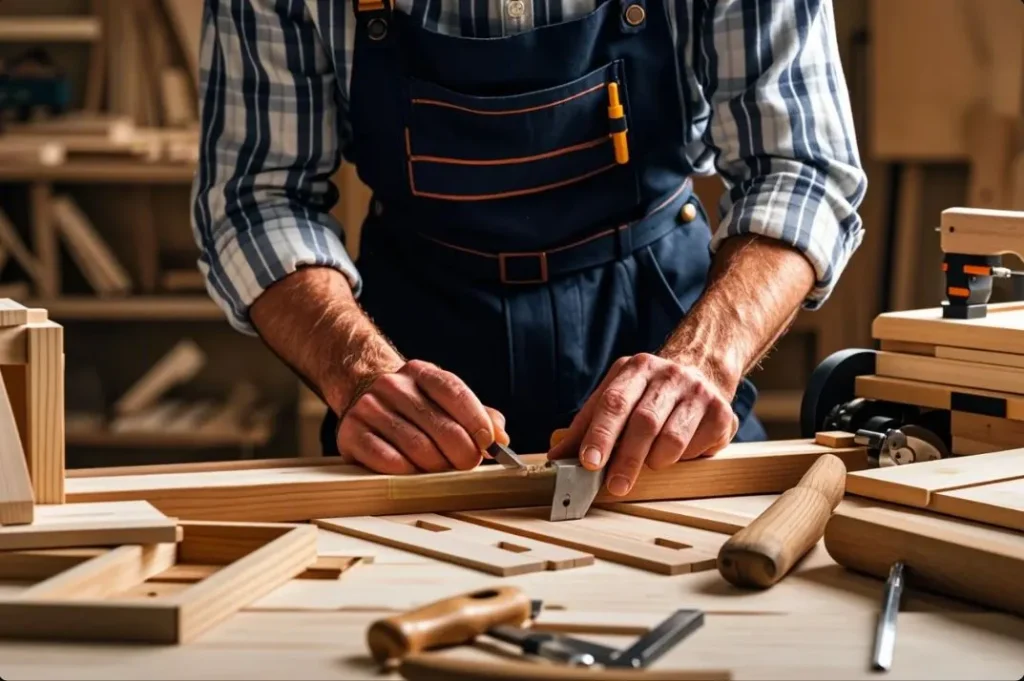What is a Joiner?
A joiner is a craftsman who works predominantly in workshops or factories, focusing on fabricating, assembling, and installing wood components such as doors, windows, staircases, and furniture pieces. Unlike carpenters who work on-site and deal with various materials, joiners specialize exclusively in working with wood. Their work requires precision, attention to detail, and an understanding of various woodworking techniques to transform raw materials into finely crafted components that meet architectural specifications and client requirements.
Key Skills and Responsibilities of a Joiner
Joiners possess a diverse skill set that is essential to their role:
- Woodworking Mastery: Proficiency in using various hand tools and machinery to cut, shape, and join wood accurately and efficiently.
- Technical Proficiency: Ability to interpret detailed technical drawings, blueprints, and specifications to produce precise measurements and execute complex joinery techniques.
- Attention to Detail: Ensuring the quality and precision of each component, from joints and fittings to finishes and surface treatments.
- Material Knowledge: Understanding the properties and characteristics of different types of wood, including their suitability for various applications and environments.
- Problem-Solving Abilities: Addressing challenges that arise during production, installation, or restoration projects with innovative and effective solutions.
Their responsibilities encompass several crucial tasks throughout the construction process:
- Manufacturing Components: Crafting custom-made wood components based on architectural designs and client specifications, often requiring specialized joinery skills to achieve intricate details and structural integrity.
- Installation: The finished components are installed on-site, ensuring seamless integration with the overall construction project and adherence to safety and building codes.
- Maintenance and Repair: Providing ongoing maintenance services and repairs for existing wood structures and components to prolong their lifespan and maintain their functionality and aesthetic appeal.
Is a Joiner a Construction Worker?
While joiners are essential to construction projects due to their specialized woodworking skills, they are typically classified separately from general construction workers such as carpenters or laborers. Joiners specialize in precisely crafting and installing wood components, contributing significantly to the aesthetic and functional aspects of buildings and structures. Their expertise is creating bespoke solutions that enhance interior spaces and architectural designs through meticulous craftsmanship and attention to detail.
Career Path and Education Requirements
Becoming a joiner involves a combination of formal education, apprenticeship training, and practical experience:
- Education: Some joiners begin their careers with vocational training in woodworking or carpentry, while others pursue formal education programs that offer specialized training in joinery techniques and practices.
- Apprenticeship: Many joiners complete apprenticeship programs under skilled professionals to gain hands-on training and practical skills in woodworking, joinery, and construction techniques.
- Certification: Depending on regional or national requirements, joiners may need to obtain certifications or licenses to practice professionally and ensure compliance with industry standards and regulations.
- Career Progression: Depending on their interests and career goals, experienced joiners may advance to supervisory roles or project management positions or specialize further in areas such as furniture making, architectural joinery, or historical restoration.
FAQs
1. What is the difference between a joiner and a carpenter?
Joiners specialize in woodworking and typically work in workshops, crafting and assembling wood components such as doors and furniture. Carpenters, on the other hand, work on-site and are involved in constructing and installing structures using various materials beyond wood.
2. How much does a joiner earn?
Salaries for joiners vary based on factors such as location, experience, specialization, and the complexity of projects. Joiners with advanced skills and experience in specialized areas like bespoke furniture making or architectural joinery often command higher wages.
3. What tools do joiners use?
Joiners utilize a wide range of tools and equipment, including saws, planes, chisels, drills, sanders, and specialized machinery, to cut, shape, and finish wood precisely and efficiently.
4. Are joiners in high demand?
The demand for skilled joiners remains consistent across the residential, commercial, and industrial construction industry sectors. Opportunities exist in niche markets such as custom furniture making, interior fit-outs, and heritage restoration projects.
5. Can joiners work independently?
Yes, experienced joiners often have the option to work independently or establish their workshops or businesses. This allows them to offer specialized joinery services tailored to client’s needs and preferences, ranging from custom furniture pieces to intricate architectural details.






